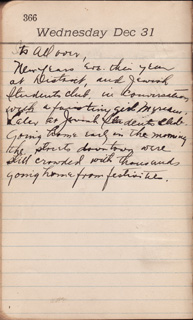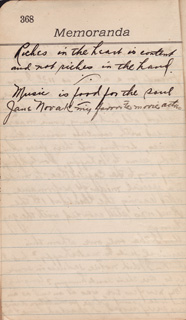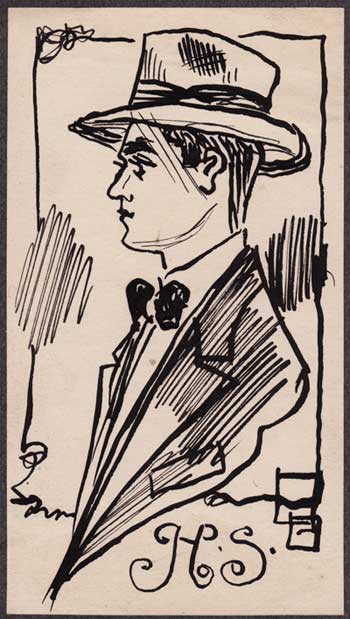
Home and radio night.
The year is ending
a new book shall be
written.
and may the pages
chronicle only happy
events. Amen
—————
Matt’s Notes
Papa’s had a mixed relationship with “home and radio” nights all year. As we’ve discussed before, the kit-built radio set he posed with in the photo below indicates an early adopter’s love for the medium (by “early” we mean he’d probably built his radio set somewhere around 1922 when commercial radio first became viable) and 1924 was particularly full of breakout developments in broadcasting. Among other things, it was the first year a presidential campaign season, including both national conventions, played out on the airwaves, it was the debut year of New York’s venerable public radio station, WNYC, and it was the year AT&T, the biggest corporate player in the industry, made nationwide broadcasts through connected affiliate stations a common practice.

Yet thrilling as it was to listen to the radio in 1924, the isolating effect of Papa’s headphones put an unwelcome accent on a year in which his longing for companionship became deeper and less forgiving. Though he had no privacy when he was “living in board,” his move to an apartment of his own on Attorney Street left him ill at ease and disconnected. This intensified, as those of you who have been following well know, after he learned of his father’s death in the old country, an event that left him bereft, unmoored and, since it fell to him to cover burial expenses, depressingly in debt. (He felt so desperate that he invited his neighbor’s son to stay in his apartment for a time.) Later on he got himself a telephone so he could hear some friendly voices in his spare surroundings, but he found as little comfort in it as he did in formerly reliable distractions like movies, baseball, and his radio.
The year was not entirely free of satisfying moments, naturally. Papa enjoyed his visits to Coney Island, the Metropolitan Opera house, and New York’s assorted parks; he felt the pangs of love for a couple of different women, and though these episodes were disappointing in the end they were food for his romantic soul; he co-founded the “Maccabean” chapter of the fraternal organization, B’nai Zion (Order Sons of Zion) and became its Master of Ceremonies; he saw speeches by and occasionally met his Zionist heroes; he witnessed the first endorsement of Zionism by organized labor, a spiritually inspiring convergence of his most beloved causes; and he welcomed the arrival of two new nephews.
By the end of the year, Papa had emerged from the shadow of mourning and perhaps grown up a little. As I’ve mentioned before, I think his father’s death allowed him, if in a wrenching, unpleasant way, to give up his attachment to the old country and the long-held dream that he could somehow recapture the idealized comforts of his boyhood. It may, in fact, have helped him stop spending quite so much time with his daydreams in general, prompted him to stop wishing for the life he would like and start working on the life he could have. It was, for Papa, a remarkable year, the sort of year people have when they’re twenty-nine.
I wonder, did Papa review his own year in the way I just have when he penned his 1924 diary’s last “home and radio” entry? Or did he just think about the coming year and his prayer to fill “a new book” with only “happy events”? If such a book literally exists I don’t have it, but I know his future. I know he was about to meet my grandmother, I know he would, at last, have a family of his own. I know he found his happiness and that his happiness included me. And I know I’m here now, and I know he can’t hear me, but I swear I’m sitting and whispering the word “Papa” like a spell, whispering Papa, Papa, Papa, please tell me what comes next.

 I’m looking forward to it, but right now I want to make sure I cover every word left in his diary, because he did write a couple of of more lines on the last “Memoranda” page, each separated by a little squiggle:
I’m looking forward to it, but right now I want to make sure I cover every word left in his diary, because he did write a couple of of more lines on the last “Memoranda” page, each separated by a little squiggle:









